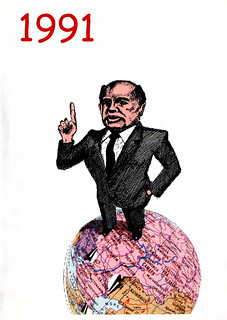Most of my posts to-date have focused on blogging and
teaching. This post takes a very different direction; it’s the potatoes to add
a little variety to my overly meat-rich diet.
The United World College movement has just turned 50. The
power and pervasiveness of
Kurt
Hahn’s original vision constantly surprises me as it finds expression in
unexpected places. One recent voice to contribute to this conversation is
Mikhail Gorbachev, a
figure who, in my mind, stands in significance with the likes of fellow Nobel
Prize winner Nelson Mandela and Mahatma Ghandi for the positive impact he has
made on 20
th Century politics. It is thus humbling and surprising to
find Gorbachev taking the time to address the UWC community directly.
Dear
friends,
Please
accept my congratulations on the
occasion
of the 50th anniversary of United
World
Colleges. During the years of its existence
your
movement has been able to considerably
influence
several generations of students from
many
countries in a spirit of mutual respect,
peace and
sustainable development. Today, this
mission
is as important as ever.
In
today’s world, old threats to peace are
persisting
and new ones are emerging.
The
current economic crisis, the crisis of
international
relations and the threat of a new
 |
| http://www.flickr.com/photos/osipovva/5498928857 |
arms race
testify to the fact that the twenty
years
after the end of the Cold War have been
largely
wasted instead of being used to build a
more
secure and just world order.
The
economy of many countries is in deep
crisis.
One of the causes of this crisis is the
model
that has defined global development for
the past
few decades, a model based on seeking
superprofits
and overconsumption, on social and
environmental
irresponsibility, making the
human
being merely a cog in an economic machine.
I am
convinced that a transition to a new model
is
inevitable. But this requires joint efforts of the
scientific
and academic community. I therefore
applaud
the vigorous efforts of your movement
to
support the right to peace, social justice
and
sustainable development and stand up
against
injustice and inequality. It is particularly
important
that your students and alumni take
this
stand not merely in rhetoric but by working
actively
in various humanitarian, educational
and
environmental projects on all continents,
thus
showing an example of engagement and
civic
responsibility.
I find this letter sobering. The last twenty years, he tells
us, ‘have been largely wasted’. We have not build a ‘more secure and just
world’ but instead have focussed on ‘superprofits and overconsumption, on
social and environmental irresponsibility, making the human being merely a cog
in an economic machine.’
As I sit here in Singapore, an employee of UWCSEA, it is
hard not to take this analysis to heart. This is a wealthy country where
Mercedes and BMWs are big, black and ubiquitous. There seems sometimes to be
something a little inadequate in a lunchtime bake-sale which raises a few
hundred dollars for a worthy cause when each of us live a lifestyle built,
literally, on the cheap labour of imported workers.
What Gorbachev reminds me is that my footprint on the earth
is real and I must always look carefully to see where I am treading. The UWC
mission walks a precarious line as we both rely on the ‘economic machine’ for
the resources that allow us to exist and simultaneously explore and question
its workings. The social responsibility one has in a position of privilege
requires significant and difficult reflection.
Gorbachev himself provides a good lesson in the value of
working carefully from within ‘the machine’. His reform agenda for the Soviet
Union through “
perestroika”
resulted in the dissolution of the USSR and the birth of modern Europe. The
central tenant of that movement was the notion of “
glasnost”, or “openness”, and
it is this idea that I think has particular resonance with the UWC movement.
Kurt Hahn’s belief was that if you could put people from different cultures
together and educate them as equals, they would emerge from their schools with
a greater potential to create a just and peaceful world. I think he would have
liked the idea of glasnost.
